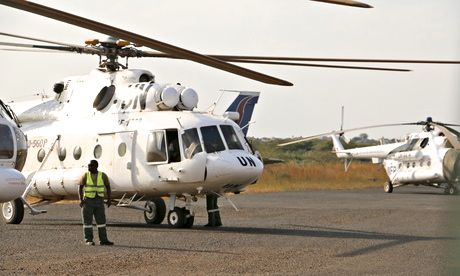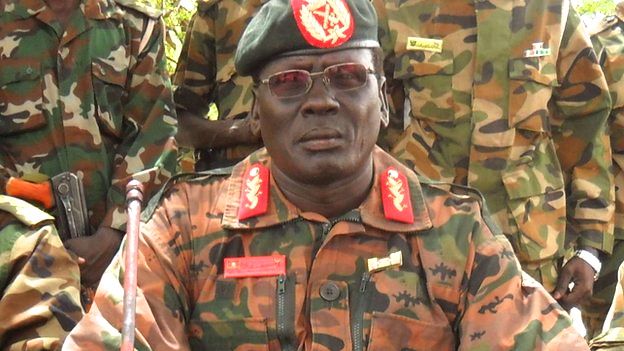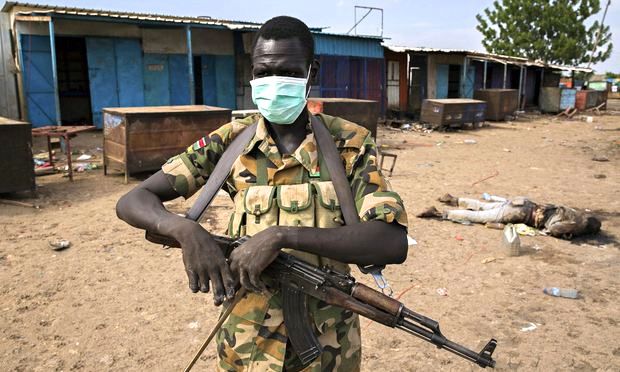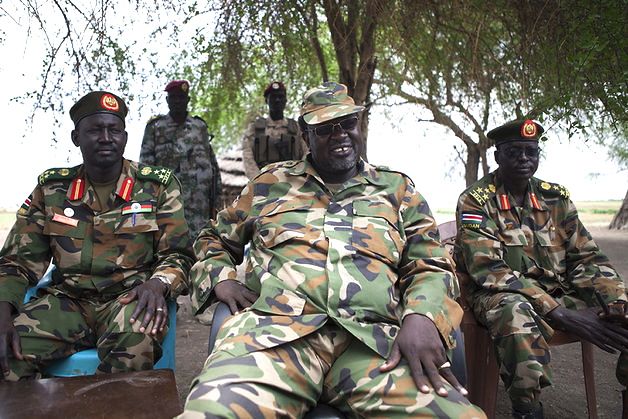As fighting rapidly accelerates with the arrival of the dry season, the rebel forces that make up what has been designated, without precision, the “Sudan People’s Liberation Army/in Opposition” (SPLA/iO) will be badly hampered by the lack of effective communications and intelligence-gathering capacity. Lacking these key elements of modern warfare, it is not surprising that a “press release,” riddled with errors, was issued yesterday (November 1) by one faction of the rebel groups; it amounts to a threat against UN helicopters used for moving humanitarian cargo.
Background
On August 26, 2014 a clearly marked UN Mi-8 cargo helicopter on a routine flight from Wau to the west was shot down approaching Bentiu (capital of Unity State, South Sudan).
Russian Mi-8 transport helicopter used by UN
Although it was quickly ascertained (if not officially confirmed until much later) that the helicopter had been shot down, and that an investigation would follow, it has now been 68 days since the shoot-down and there has been no word from the UN investigators. I discussed the substantial evidence available early on (http://wp.me/p45rOG-1p3); this included an August 21, 2014 intercepted recording of Sudan People’s Liberation Army/in Opposition Commander Peter Gadet as he is speaking by telephone with the senior air traffic controller for the UN Mission in Sudan (UNMISS) in Bentiu (Gadet is the military leader in the Bentiu area).
In this recording (available upon request) Gadet repeatedly accuses UNMISS of moving military equipment for the Sudan People’s Liberation Army/Juba (SPLA/J, the army of the Government of South Sudan). He does not appear to comprehend the controller’s repeated statements that the SPLA/J uses fixed-wing aircraft for troop and supply movements, and that it has no supply helicopters in use anywhere near Bentiu. Accompanying Gadet’s accusations, often wildly agitated and almost incoherent, are repeated threats to shoot down UN helicopters. Indeed, the point of the call Gadet made was precisely to issue this threat. Five days later, the UN helicopter was shot down, killing three Russian crew members working for the UN and injuring a fourth. (Russian officials made clear very early on that they were convinced the helicopter was shot down, not a victim of mechanical failure or pilot error.)
SPLA/iO Commander Peter Gadet
Gadet is a notoriously brutal and untrustworthy soldier, changing sides more than half a dozen times during the long civil war; he also bears command responsibility for the terrible atrocities in Bentiu that occurred when the town was seized by his forces. Although both sides in the war have been guilty of savage atrocity crimes, by all accounts—of all the horrific scenes that have been witnessed in the civil conflict wracking South Sudan—Bentiu was the worst:
According to the UN, rebels slaughtered hundreds of people when they seized Bentiu, the capital of Unity state, hunting down men, women and children who had sought refuge in a hospital, a mosque and a Catholic church. The victims included Sudanese traders, especially from the Darfur region. The rebels issued a statement boasting of “mopping- and cleaning-up operations”, the UN alleged, and fighters took to the radio to broadcast hate speech, urging men to rape women of specific ethnicities and demanding that rival groups be expelled from the town. “Use of hate speech via a public radio station to incite violence is a game-changer,” said Lanzer, who was in Bentiu on Sunday and Monday. (The Guardian, 22 April 2014)
An SPLA/iO soldier amidst the carnage in Bentiu, April 2014
Given Gadet’s penchant for violence and total lack of respect for international law governing the conduct of war, the UN now finds itself in a difficult position. If it names Gadet as responsible for the August 26 helicopter shoot-down, he may well respond by declaring a no-fly zone over Bentiu and its environs, shutting off a key humanitarian corridor and destination. On the other hand, if no responsibility is assigned, despite the overwhelming evidence indicating Gadet’s responsibility, then a terrible precedent will have been set: in order to secure humanitarian access, the UN is willing to let a terrible war crime go unpunished, indeed without assigning responsibility. It is a lesson that will be quickly learned, and put at risk other critical humanitarian sites in South Sudan and perhaps in other conflict regions.
The SPLA/iO Press Release, dated 1 November 2014, declares:
“United Nations in South Sudan is renting its helicopters to SPLA soldiers in Bentiu. Their helicopters are taking wounded soldiers from Rubkonni to Juba. Also, they are importing soldiers from different locations in South Sudan to Rubkonni area. We the freedom fighters condemn in strongest terms the bad behaviors demonstrated by UN personnel who happened to be in South Sudan to safe lives. Its air uplifting of SPLA-Juba soldiers to and from war zone is not in line with Geneva Convention. It is confirmed that its helicopters are very busy for picking up wounded soldiers in the bush to Juba. SPLA-IO needs to take this predatory behavior by UN personnel into consideration. It is forbidden for UN helicopters to have any business in active war zone.”
What to make of this unsubstantiated and, according to all UN officials speaking on and off the record, erroneous accusation? It should be emphasized again that the SPLA/iO has very poor communications and intelligence-gathering capacity, and this may be part of the problem. Military activities have begun to increase significantly in and around Bentiu as the dry season begins, and mobile fighting becomes easier. At the same time, communications become all the more difficult. Chaotic violence will be the inevitable result unless the two sides agree to an immediate cease-fire. If full-scale fighting resumes, it will quickly gain a momentum that will be difficult to reverse. Moreover, if Khartoum follows through on its promise to provide strategically significant weaponry to Riek Machar, titular “head” of the SPLA/iO (http://wp.me/p45rOG-1sZ), this guarantees that Riek and the forces he controls will fight for military advantage, at the very least to strengthen his position at any meaningful negotiations (so far there have been none).
Riek Machar
But another deeply troubling question is whether this accusation is an implicit threat to the UN: “Do not name Peter Gadet as responsible for shooting down the UN helicopter on August 26 [the height of the rainy season], or we will create big problems for your transport helicopters as a whole.” There can be no confirmation of such a surmise, but it is a distinct possibility. Indeed, Khartoum’s restriction on UN air movements—by humanitarians and UNAMID forces—are a pervasive fact of life in Darfur. Moreover, although the press release was issued in the name of the “Sudan People’s Liberation Army/in Opposition,” this is a vague designation. Certainly there is no equivalent of a central command; Riek Machar is not in control of the majority of fighting elements comprising the SPLA/IO; it is quite possible, given the rag-tag quality of communications, that this press release was issued simply by elements of the rebel faction near Bentiu. The knowledge seems to be entirely local (there is no mention of Malakal or other contested cities and towns).
So far UN agencies and international nongovernmental humanitarian organizations have been able to forestall the worst of famine and outbreaks of deadly diseases, although the larger humanitarian situation remains highly precarious. It has been dangerous and heroic work. Toby Lanzer, who heads up UN operations, has been superb in his management of the effort. But if transport is interrupted by threats from rebel groups, if helicopters painted white and clearly marked with UN lettering cannot deliver critical supplies, then we will see a rapid rise in morbidity and mortality. Many thousands have died, perhaps tens of thousands; that number will increase dramatically if there is an interruption of critical transport routes.



